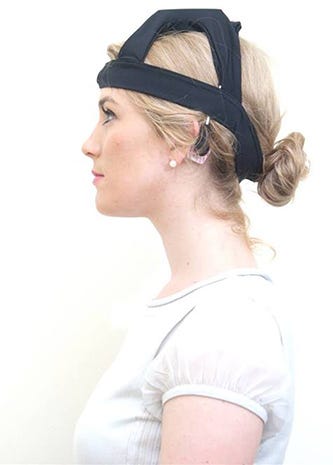Brain-Reading Tech Could Detect Drug Side-Effects
August 22, 2014
The iBrain, a cutting-edge, portable device can record single-channel EEG readings from individuals with or without pathologies or treatment.
 The maker of the device, NeuroVigil has a growing database that couple a myriad of proprietary algorithms to extract biomarkers from these signals. NeuroVigil retains exclusive ownership of these disease and drug biomarkers, and has recently partnered with a large pharmaceutical company with plans to use the iBrain technology in its neurological research.
The maker of the device, NeuroVigil has a growing database that couple a myriad of proprietary algorithms to extract biomarkers from these signals. NeuroVigil retains exclusive ownership of these disease and drug biomarkers, and has recently partnered with a large pharmaceutical company with plans to use the iBrain technology in its neurological research.
The hope is that the neurotechnology system can help identify the presence of side effects caused by various psychiatric drugs taken prior to and after consuming medication. The company has also partnered with the University of Basel to help further advance their research into Rett Syndrome, a rare genetic neurological disease that occurs predominantly in women.
The device gained notoriety in 2012 when it The New York Times hailed the technology as "A Little Device That's Trying to Read Your Thoughts." The paper also reported that famed physicist Stephen Hawking, who is paralyzed by Lou Gehrig's disease, used the device to communicate.
The iBrain functions as a miniature electronics box attached to a light and a flexible elastic head harness. The device also contains electrodes that can effortlessly be applied to the head during sleep. Other modifications include a rechargeable battery that provides hours of continuous readings and a USB port for simplified data transfer that can be used to store days of recorded data.
The device was launched commercially in 2009, and now supports early central nervous system pharmaceutical research. The company recently announced its new partnership in an effort to extend the reach of their innovative iBrain device across the borders of research in neurological disorders. The company's founder and chairman Philip Low, PhD expressed his excitement over the partnership in their latest press release.
"This new collaboration heralds an advancement for both parties," he said. "To discover and promote innovative methods to monitor disease and ultimately improve human health. Our first research partnership grew out of Basel five years ago. We are delighted and honored to return to Basel and work with our new collaborators, and we are excited to focus on our human based, non-invasive neurotechnologies to develop a deeper understanding of some of Humanity's most challenging and mysterious conditions."
Low created NeuroVigil in 2007, and the company has established itself among the world leaders in neurotechnology research. The company is dedicated to the betterment of the human condition through the merging of non-invasive wireless brain recording technology with advanced computational analysis techniques on human data.
The company has active programs in neuroengineering at its Southern California headquarters based in La Jolla, as well as an advanced computational neuroscience program at its NASA satellite laboratory in Silicon Valley.
While the research is still in its infancy stages, one thing remains clear. NeuroVigil is establishing itself as the leader in neurotechnology research, and is fast becoming a company on the road to groundbreaking discoveries in neurological realm of research and development.
Refresh your medical device industry knowledge at MEDevice San Diego, September 10-11, 2014. |
Kristopher Sturgis is a contributor to Qmed and MPMN.
Like what you're reading? Subscribe to our daily e-newsletter.
About the Author(s)
You May Also Like

.png?width=300&auto=webp&quality=80&disable=upscale)
